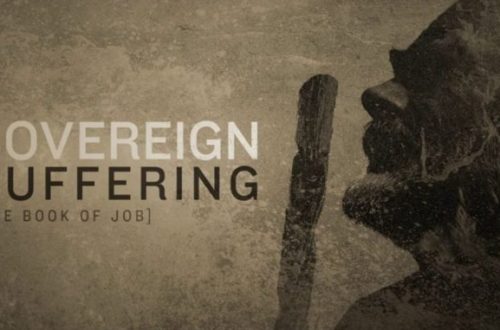Remaining faithful to the Lord
November 1st is the twenty-second Sunday after Pentecost. It’s also traditionally observed as All Saint’s Day in many faith traditions. In this case, Matthew 5:1–12 is part of the lectionary readings.
Jesus announced that God’s kingdom was drawing near (Matt 4:17). This raises the question: What attitudes and actions are appropriate for a citizen of God’s kingdom? The Messiah answered this question in what is known as the Sermon on the Mount (chaps. 5–7).
Although Jesus’ primary audience would have been His disciples, there was a larger crowd of people who listened to Him teach (7:28). The ethics Jesus taught in His sermon contrasted sharply with the legalism of His religious critics. Because the Pharisees and scribes coveted external forms of righteousness, Jesus launched His sermon by denouncing such an approach to life.
There are two views regarding when and where the Sermon on the Mount was preached. One group asserts that it is a compilation of various teachings that were given on different occasions in several places. A second group believes the sermon was delivered at one time early in Jesus’ ministry and in one location (for example, on the side of a mountain near Capernaum).
Portions of the Sermon on the Mount are similar to Jesus’ Sermon on the Plain (Luke 6:20–49). Some experts think these passages represent two different messages given on separate occasions, while others think the two passages represent the same message. According to the second view, Luke presented an abbreviated version of the longer sermon recorded in Matthew.
The “crowds” of Matthew 5:1 who came to hear Jesus’ sermon are presumably the same as the “large crowds” of 4:25 who followed Jesus. They came from at least a 100-mile radius of the territory to listen to Jesus teach (5:2).
As the Master Teacher, Jesus employed the normal sitting posture of a Jewish rabbi. God’s supreme Old Testament revelation—the Law—was given by Moses, accompanied by thunder and lightning, from Mount Sinai. One greater than Moses gave this sermon also from a mountain region, probably near the Sea of Galilee.
We do not know exactly where Jesus preached the Sermon on the Mount. A traditional site, however, is on a hillside near Capernaum, on the northwest shore of the Sea of Galilee. Part of the “crowds” (4:25; 5:1) Jesus drew came from the thousands of people who lived in the cities and smaller settlements that dotted the Sea of Galilee’s coastline during the first century AD.
At various times in history, there have been common misconceptions made about the Sermon on the Mount. Some have said it is nothing more than a call to social action, while others regard it simply as a list of things to do to be happy. Still others say the sermon is not applicable for this age, but only for the Kingdom age to come.
As we read the sermon, we should be careful to put it in its first-century context and let the lessons appearing in it speak for themselves. For instance, consider Matthew 5:3. In this verse, we are immediately struck by the presence of the word “blessed.”
This refers to the spiritual wellness of believers. The term conveys the idea of being the privileged recipient of God’s favor, and so enjoying a happier end than the wicked.
Jesus’ various declarations of blessedness are commonly called the Beatitudes. This term comes from the word beati, which is used in the Vulgate, an important Latin translation of the Bible. In short, the word refers to a state of bliss.
The Messiah pronounced His first blessing on the “poor in spirit,” which is a reference to humility. These are believers who have been stripped of their own securities and deeply feel their need for God. The Savior’s redemption, not their own goodness, is the basis for their citizenship in heaven.
The attitude and lifestyle Jesus’ taught is foundational to all the other virtues the Savior commended. For instance, we cannot mourn without recognizing how unable we are to handle life in our own strength (v. 4).
We cannot be meek unless we humbly acknowledge our need for gentleness (v. 5). We cannot long for righteousness if we proudly view ourselves as already righteous (v. 6). We cannot be merciful without recognizing our need for God’s mercy (v. 7).
We cannot be pure in heart if our heart is filled with pride (v. 8). We cannot be peacemakers if we arrogantly assert that our way is always right (v. 9). Finally, we cannot stand up under persecution without Christlike humility (vv. 10–12).
Jesus pronounced His second blessing on the mournful, who will receive God’s comfort. “Those who mourn” (v. 4) weep because they know they have transgressed against the Lord. Also, they cry in confession and repentance, which reflects their humble spirit.
These believers do not look to the world for satisfaction, joy, or comfort. Rather, they find these things in the Savior alone. They come to Jesus in humility and faith, confessing their sins, and He enters their lives and stays there with the sweet assurance of His forgiveness.
Jesus gave His third blessing to the meek and promised them the earth as an inheritance (v. 5). Meekness has two aspects.
On the one hand, the meek bear up under provocations, control their feelings, and refuse to get even. On the other hand, they are courageous, generous, and courteous. They put others, not themselves, first.
Here we find Jesus explaining the values of the Kingdom. Relationships, possessions, information, prayer, money, and power are a few of the categories He redefined from God’s perspective.
Jesus showed that following Him involves radical change. For most of us this means undoing the way we have always acted and reconsidering traditional sources of wisdom from our family, friends, and culture. To become like Jesus requires us to do a tough-minded review of our moral values and lifelong goals and dreams.
Jesus next blessed those who longed for righteousness and promised to fulfill their desires (v. 6). The attitude is one of desiring God above all things and seeking to be in a right relationship with Him and others. While greed, injustice, and violence consume the unsaved, believers yearn for justice and goodness to be established.
In these first four beatitudes there is a logical progression. First, we admit our spiritual bankruptcy (v. 3). Seeing ourselves as “poor in spirit” causes us to “mourn” (v. 4) our condition.
Because we grieve over our sorrowful state, we come to a correct notion of ourselves, which is to be humble and meek (v. 5). So, by accepting the appraisal arrived at in verses 3 through 5, we are ready to “hunger and thirst for righteousness” (v. 6).
Next, Jesus blessed the merciful and said they would be treated with mercy (v. 7). This verse is talking about having a gracious disposition toward others.
The merciful are kind, charitable, and ready to emphathize with the sufferings of the afflicted. They long for justice, but are not harsh and cruel.
Also, the merciful seek to be generous to all by showing the love of God without partiality or preconditions. The merciful receive God’s favor, for they are the beneficiaries of His mercy.
Jesus gave His sixth blessing to the pure in heart and promised that they would see God (v. 8). The focus here is on being genuine and honest in all one’s dealings.
Such purity requires spiritual discipline and self-control. It renounces self-love for the love of God. Sin is the enemy of moral purity, and popular ideas and activities conspire to undo it.
Furthermore, the world ridicules and taunts the virtuous for not having fun. Yet, instead of fun, the pure receive the greatest gift of all, namely, a personal encounter with the living God. When we come to know the Father through faith in the Son, we are truly fulfilled.
In the seventh beatitude, Jesus pronounced a blessing on the “peacemakers” (v. 9). In saying they would be “called sons of God,” Jesus meant they would become spiritual children in God’s heavenly family (John 1:12; Eph. 1:5).
Peacemakers do not merely stay cool, calm, and collected. They also work for peace in their families, schools, churches, businesses, and communities.
Jesus is the ultimate peacemaker (Isa 9:6), for He destroyed the enmity between sinners and God (2 Cor 5:18–19; Eph 2:13–18). Jesus not only brings us peace with God, but also heals our broken relationships (Rom 5:1).
In the final beatitudes, Jesus blessed the persecuted and promised them the kingdom of heaven (Matt 5:10). He taught that when believers stand up for truth, righteousness, and goodness, they will be slandered and insulted (v. 11). Such persecution arises because of taking a stand for righteousness and being known as a follower of the Messiah.
Jesus gave two reasons that His harassed followers could accept their circumstances with an attitude of joy (v. 12). First, they ought to realize that their eternal reward would exceed their wildest expectations. Second, they can remember that God’s enemies also mistreated His prophets.
As followers of the Redeemer, we should not be shocked when we are slandered, physically harmed, or targeted with malicious rumors. Although we feel the intense pain of such injustices, we can persevere by holding onto the promise of God’s richest blessings.
For instance, Jesus said that heaven belongs to the persecuted. By this He meant they would have a place of distinction in the kingdom of God.
In this present world, many believers are harassed and abused by others for the cause of the Son. The world might regard them as nobodies, but God considers them as people of honor who should be given nothing less than unending joy in His presence.
Key ideas to contemplate
Jesus longs for us both to have and demonstrate the spiritual qualities He possesses. There are some virtues that we would really like to have. Yet, we find them difficult to possess and express. There are other qualities that seem undesirable to us, for they run counter to our own worldly values.
In either case, Jesus still wants us to be different, to be a purifying agent in a sinful world, to be the “salt of the earth” (Matt 5:13). He also yearns for us to stand out like a “city built on a hill” (v. 14).
If we accept Jesus’ offer of love, grace, and mercy, He will empower us to be a source of spiritual “light to all in the house” (v. 15). When this is consistently true for us, there are certain virtues that will become increasingly evident in our lives.
1. Be distinctive. Living for God often means being different from people of the world. We have to be willing to love when others hate, to give when others take, and to help when others abuse. Yet, by giving up our own rights in order to serve other people, we’ll one day receive the eternal rewards God has in store for us.
2. Be humble. Reflecting Jesus’ humility isn’t easy, especially when the world around us is grasping for power and pride. Admittedly, though our Christian faith may make us unpopular, it can sometimes bring us a certain measure of attention. At those times, if we don’t remember who we are and who God is, we can easily find ourselves using our Christian notoriety to promote our own personal interests.
3. Be unpopular. Surely there are times when our Christian lifestyle will cause us to be alienated from and ostracized by others. Remember that we were forewarned. Yet, we’re also promised a heavenly reward as a result of living for Jesus.
4. Be noticed. The only way we’ll ever get “persecuted for righteousness’ sake” (v. 10) is if it becomes known that we’re followers of Christ. We can’t always run and hide from the truth that we belong to God. In fact, our being verbally, emotionally, and even physically persecuted proves that we are being faithful to our Lord.




